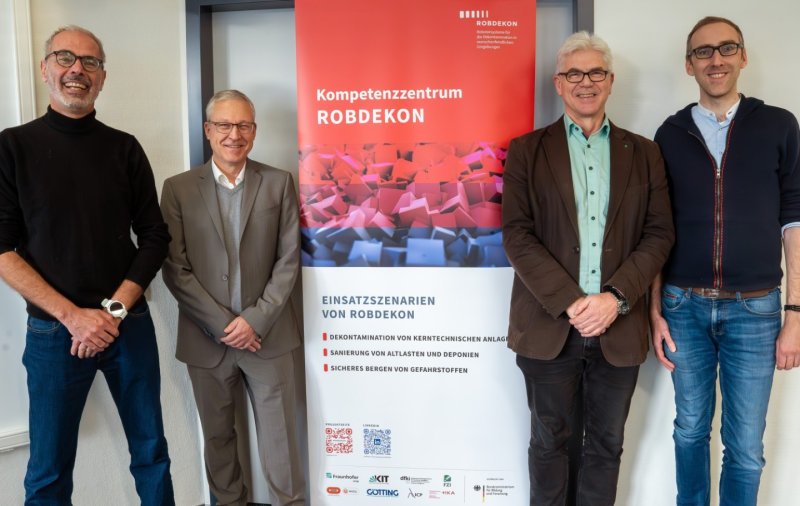· Press Release
ROBDEKON competence center established through founding of a registered association
With the founding and registration of the non-profit ROBDEKON e. V., the competence center “Robots for Decontamination in Hazardous Environments” is now standing on its own feet.
The founding of the association will enable the center, which has been funded since 2018 by the Federal Ministry of Education and Research, now the Federal Ministry of Research, Technology, and Space, to drive innovation and support industry partners in the long term. In addition to decontamination tasks, the focus is on similar technological challenges in areas such as civil security, agriculture, and construction. Interested companies, organizations, and individuals can now become members of the association. According to its statutes, ROBDEKON® e.V. is a point of contact for questions relating to AI-based robot systems for decontamination tasks. It promotes research, science, and practical transfer, creates training opportunities, and provides a neutral platform for the exchange of information, opinions, and knowledge.
“Members benefit from direct exchange with leading research institutions.”
“Our goal is to create a network of experts and users and thus an optimal environment for innovation in this technology sector,” explains the association's chairman and ROBDEKON spokesperson Prof. Dr.-Ing. habil. Jürgen Beyerer, who heads the Fraunhofer Institute for Optronics, System Technologies, and Image Exploitation IOSB and the Chair of Interactive Real-Time Systems at the Karlsruhe Institute of Technology (KIT). “Our members benefit from direct exchange with the leading research institutions in this field. They can contribute their practical needs and problems and thus also help shape the direction of research.” All information on membership can be found at .
“Also useful in natural disasters, agriculture, and construction”
In terms of content, ROBDEKON focuses on robot systems for decontamination in nuclear facilities, for the remediation of landfills and contaminated sites, for the recovery and handling of hazardous materials, and for cleaning tasks. However, according to the statutes, other technologically related application domains are also to be considered. Jürgen Beyerer comments: “If we enable robots to move independently in unstructured terrain, map it, and grasp any objects; if we equip heavy machinery with autonomous capabilities and link them to intelligently operating robot teams; if we finally develop interfaces, control stations, and operating concepts to deploy robots flexibly and with a reasonable degree of human supervision and involvement, then it is obvious that this will also be useful in other areas. For example, in coping with natural disasters such as forest fires or earthquakes, or in agriculture and construction, where the shortage of skilled workers makes it necessary to automate time-consuming routine tasks.”

Expertise in decontamination and large-scale robotics for the Robotics Institute Germany
With its specific expertise in the field of decontamination and large-scale robotics, the competence center works closely with the “Large-scale offroad robotics” cluster of the Robotics Institute Germany, a decentralized competence network for AI-based robotics founded in 2024, with which it shares considerable personnel and institutional overlaps. ROBDEKON has been conducting research into robot systems for decontamination tasks since 2018. In the current, second funding phase of the competence center, the focus is on practical applicability and transfer. To this end, the consortium partners are testing the technologies and demonstrators developed in pilot projects with practical partners in order to improve their maturity and applicability in a targeted manner. Insights into this are regularly published on the website .